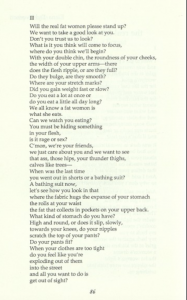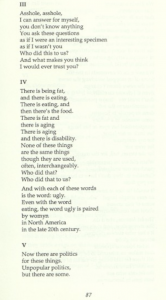Published in Issue 33 of Sinister Wisdom, this 11-section poem by Elana Dykewomon, who employs the feminist tactic of using “womon” as opposed to woman to imply women are not a derivative of man, creates an honest portrayal of a fat woman’s internal struggles to negotiate their perception of themself with that of society. This struggle can be seen with the repetition of questions such as “who did that to us?,” which is a question posed in sections III and IV as well as other sections through the poem.

Section II of this poem has an invasive tone as the narrator probes “the real fat womon” with intrusive questions (line 34). Many of the questions are personal questions about the woman’s body. The invasiveness of the questions is poorly hidden under the guise of a caring friend, implying that friendship entitles someone to ask probing questions to exoticize and marvel at someone’s body like they are some kind of exhibit. The poem ends with a climactic question: When your clothes are too tight / do you feel like you’re / exploding out of them / into the street / and all you want to do is / get out of sight” (lines 70-74)? This explosive question portrays an unfiltered version of what the “friends” really want to know about the fat woman. They are probing for her shame, at least the shame they believe her to have.
 Section III is seemingly a response to the questions asked in section II. In a switch of perspectives, the narrator begins by calling the “friends,” who asked the questions earlier, assholes. The narrator clearly picks up on the mal-intent of the inquiries and indicates that the questions asked of her be posed “as if [she] were an interesting specimen” rather than another human being (line 79). This illuminates how society was dehumanizing fat women.
Section III is seemingly a response to the questions asked in section II. In a switch of perspectives, the narrator begins by calling the “friends,” who asked the questions earlier, assholes. The narrator clearly picks up on the mal-intent of the inquiries and indicates that the questions asked of her be posed “as if [she] were an interesting specimen” rather than another human being (line 79). This illuminates how society was dehumanizing fat women.
Section IV of Dykewomon’s poem mentions several aspects of life that people view as things that lessen the value of women such as fatness, disability, and aging. The narrator then goes on t0 acknowledge how all of these things are conflated and equated with ugliness. The narrator again asks “Who did that to us?” Who has made women hate themselves and other women with such fervor? This is a question Fat Liberation strived to answer.
Sources: Dykewomon, Elana. “the real fat womon poems” Sinister Wisdom, Issue 33, 1987, p. 86-87
